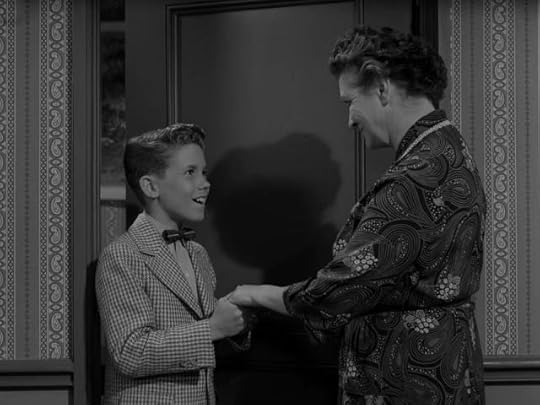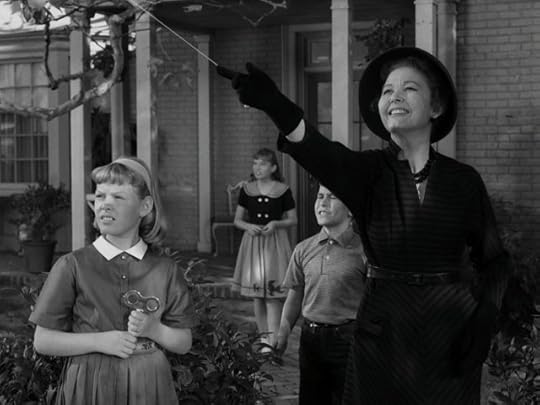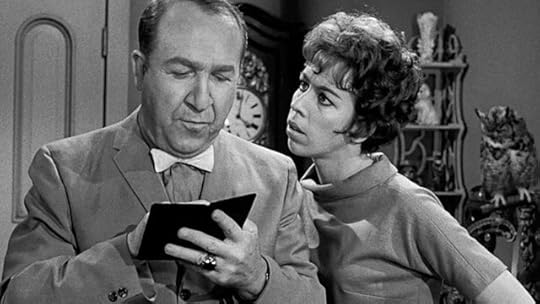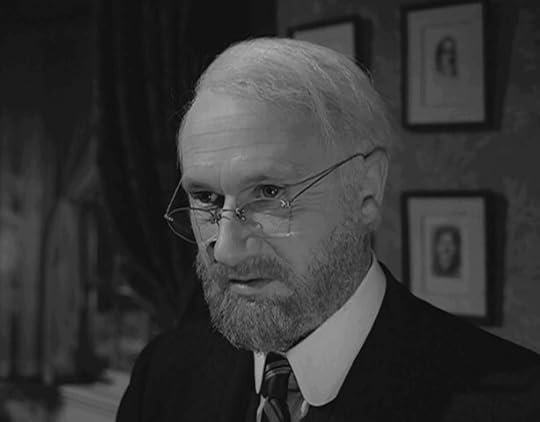September 21, 2024: The Twilight Zone rewatch contineus with season 3, episodes 33-37!
Season 3, Episode 33, “The Dummy”
This episode first aired May 1, 1962.
Cliff Robertson, who played ventriloquist Jerry Etherson in this episode, returns for a second TZ appearance following his turn as the time-traveling Christian Horn in season 2’s “One Hundred Yards Over the Rim”. Reflecting back on this episode, Robertson offers an eerie account of a missed flight and close shave with death: “…they had a reservation for American Airlines Flight #1 Friday morning and I called up and I canceled it. And I called a friend of mine and told him “Listen, I don’t want to argue with these people, but they won’t need me until at least Monday or Tuesday and I’m canceling the flight.” And he said “Cliff, you’re going to catch hell.” And I said there’s nothing in the contract that says I have to be there.” So Flight #1 takes off as scheduled on Friday morning, got right over the great Jamaica Bay, and plunged into the water – everybody perished. You’re looking at a lucky guy.”
On his experience shooting the episode: “I did my best, but the craft of ventriloquism was an art form you could not reproduce overnight. I don’t think I did justice for puppeteeers. But I did all the voices of the dummies.”
Robertson was ever appreciative of the work he was getting: “I was pretty busy. I was in the catbird seat, t.v.-wise. I was finally getting choice roles. I wasn’t getting choice roles in movies, but t.v. was keeping me alive. I began to feel a sense of acceptance on the show. I began to feel that they finally recognized who I was, not a star but a good infield shortstop. I could be depended on. Hell, you give me the right words, I’ll play your Aunt Tillie.”
Frank Sutton, who played – appropriately enough – Frank, is perhaps best known for his portrayal of the cantankerous Sgt. Vince Carter on Gomer Pyle: USMC (1964).
George Murdock, who played dummy Willie brought-to-life, is perhaps better known as pain-in-the-butt Lt. Ben Scanlon from Barney Miller (1975).
Edy Williams, who played an uncredited chorus girl, was known for her starring roles in films producd by her then husband Russ Meyer, always as a sexy vixen.
The possessed-ventriloquist’s-dummy storyline had been done before (1945’s Dead of Night) and since (1978’s Magic), but rarely as effectively as this delightfully creepy episode that concludes with one of my favorite weirdly macabre twist endings. A slam dunk Top 10 episode for me.
Season 3, Episode 34, “Young Man’s Fancy”
This episode first aired May 11, 1962.
This episode was originally titled “The House”.
Writer Richard Matheson was initially disappointed with the episode which he had hoped would be much creepier. His biggest bump was with the depiction of the mother who he felt should have been a far scarier, ghostly presence instead of just an elderly woman standing at the top of a staircase.
The opening shot of this episode featuring the house is reused in the next episode, “I Sing the Body Electric”.
A slightly different ending in the original script. Virginia follows the boy into a room that appears to be from the 1930’s. And then, before her eyes, the young boy and mother fade away, and the surroundings transform into a room from the 1960’s.
Actress Phyllis Thaxter, who played Virginia Lane Walker, was under contract with MGM and, later, Warner Bros, but the latter contract was cut short after she contracted a form of infantile paralysis while visiting family in Portland. She was married to notorious asshole and CBS TV President James T. Aubrey. She is perhaps best known for her portrayal of Ma Kent in Superman (1978).
Alex Nicol, who played Alex Walker, lent his handsome mug to many early westerns and was part of the original 1949 cast of Rodgers and Hammerstein’s Broadway musical “South Pacific. Although his character is supposed to be 34 in this episode, Nicol was actually 47 at the time the episode was shot. Writer Richard Matheson felt he was too old for the role, but he was just the writer so nobody cared what he thought.
It was hard to feel sympathy for either of these characters, momma’s boy Alex, regardless of the reasons for his mommy fixation, or Phyllis who married the manchild in the first place. The presumed eerie bits (The magazine on the couch! The vacuum cleaner in the hallway!) just felt unintentionally silly. That little kid at the end was the creepiest part of the episode but, to be fair, most kids are creepy anyway.
Season 3, Episode 35, “I Sing the Body Electric”
This episode first aired May 18, 1962.
Ray Bradbury apparently wrote several scripts for The Twilight Zone, but this was the only one produced.
This story was originally titled “A Miracle of Rare Devices”.
Bradbury was, ultimately, not very happy with the results. According to him: “”I Sing the Body Electric” turned out okay, but they took out the most important scene. In my script, the father asks the electric grandmother “Why are there electric grandmothers?”. She gives him a moment of truth: she can do something no mother ever can. She can pay attention to all of the chilren equally. Only a machine could do that, and since the father may never find a new wife, somebody has to look after the children. The electric grandmother is the substitute for the mother that isn’t there. When I saw that this scene was cut from the epsiode, I was furious! I called Rod the next day and said “For God’s sake, why didn’t you tell me?”. He apologized and said that there hadn’t been time to film it. I said “I had all of my freinds come over to the house, and we sat down to watch the show, and the most important scene is gone! I don’t want to work on your show anymore.” I tolld him that I couldn’t trust him.” Realistically, I don’t see what this missing scene would have accomplished, aside from spelling out something that is already pretty damn advice.
The rough cut of this episode underwhelmed, so scenes were reshot with a new director because original director Jim Sheldon was unavailable. While Sheldon took no issue with the reshoots, the same could not be said for other aspects of this episode: “I complained about the script before we began shooting. I did not like what they gave me and there was litle to work with. After they saw what we filmed, it was apparent they agreed with me and decided to reshoot some of the scenes.” Also: “I didn’t agree with the casting of the robot and I was never happy with that show because she was all wrong for it. But they keep re-running it all the time so I shut up. It was the only sour note in all the shows I did for them.” I agree with Sheldon about the midscasting. The kids referring to this woman as “grandmother” was one of the weirdest things about this episode.
After the show aired, Serling got wind that Bradbury was badmouthing him behind his back and ended up sending him the following letter: “Again I have to ask myself what motivates your behind the scenes back biting. I have never once, in any conversation with anyone, had anything but praise for you as a man and as a talent. It seems most odd, Ray, that you can produce this facade of freindship, break bread with Carol and me, phone on occasion, and then turn around to throw darts at me behind my back.”
Undaunted, Bradbury penned a column that saw him criticize the production: “I outlined a series of specials I wanted to do, which were received with great huzzahs, the throwing of confetti, dancing in the streets. I was told I was a grade A genuine genius and sent happily home to await the signing of contracts. Silence followed. A week or so I began to realize there was no deal. Again they ran scared when confronted with something new. I never even received, in writing, a final rejection of my specials.”
Responding to the criticism, Serling countered: “Zone is an honest effort on my part. I tried not to step on any toes, but with a show such as this, you’re almost bound to.”
And when discussing Bradbury’s TZ efforts in a later interview: “The lyrical quality of his work seems to lend itself to the printed page, rather than to spoken laguage. In the case of “I sing the Body Electric”, the words that seemed so beautiful in the story turned out archaic and wooden and somehow unblievable when a person speaks them. But this, of course, is one man’s opinnon and it’s hardly engraved on rock.” P.S. It’s my opinion as well.
This episode was, apparently, always at a disadvantage as it was rumored that late in the third season, faced with a dearth of quality material to put into production, Serling ended up reaching DEEEEP into his desk drawer to retrieve this Bradbury clunker.
While I empathize with Bradbury and his frustrating experience dealing with Hollywood, I also feel that Bradbury’s story skills, and his dialogue in particular, is perhaps not best suited to film and television. This one was a clunker, and the script is the main reason why. Still, steps could have been taken to salvage the episode during production, but it really felt as though the director feared straying too far from the source material.
My biggest gripe with this episode is that every key emotional moment is devoid of impact. Take the climactic scene for example. First, does the truck have to be moving so damn slowly and from such a great distance? Second, how about a reaction from the children at the prospect that Grandmother has sacrificed herself? Anne especially should be bawling her eyes out – so that when the robot pulls herself together, it’s a cathartic reunion. Instead, she just buries her face in dad and then Grandmother comes over and does that silly voice recording thing.
Season 3, Episode 36, “Cavander is Coming”
This episode first aired May 25, 1962.
Like “Mr. Bevis” before it, this kooky guardian angel story served as a failed pilot for a spin-off series. It’s basically the exact same story except that the awkward lead is female instead of male.
This was the only episode of the show to include a laugh track – that was mercifully lost in syndication.
This episode tops many of the fan “Most Hated Episodes” lists.
This episode marks the first time in the series that Serling utters the memorable intro: “Submitted for your approval…”
The $23,367.19 that Cavander magically materializes in Agnes’s bank account would be equivalent to $240,114.13 today.
Jonathan Winters was approached to play Cavander, but he was busy so the role went to Jesse White.
Rod Serling wrote this episode specifically for Carol Burnett and incorporated her experience as a young usherette working for a manager who, like the manager in this episode, only communicated through hand signals. She was fired when she refused entry to a couple who arrived late to Strangers on a Train because she didn’t want to spoil the surprise ending for them.
After the episode aired, Serling wrote to Burnett: “ The show you did for us is not good and it’s not bad – which makes it lousy. With a comibnation of taelnts like yorus and Jesse’s, it should have been a walloping exception. That it isn’t points up to the fact that you were done wrong by all concerned. The script, I guess, is part of the trouble, but evem more culpable is the direction. This was quite the most heavy-handed, ham-fisted, squarest directing I’ve ever cried through. God knows when it’s scheduled for – and I hope you’ll be out on a ferry boat someplace and won’t have to see it. I promise you that if given a second chance, ever, I’ll make it up.” Alas, in truth the script is 95% to blame for how this episode turned out. Sorry, Rod.
I don’t see how Serling got away with just doing a retread of “Mr. Bevis” – and as another potential pilot no less! While I can’t go so far as to say Burnett and White’s performances saved the episode, I will admit it could have been slightly worse without them. Yet another “Be happy with what you have” story that likely won’t be making anyone’s season 3 Top 10 lists.
Season 3, Episode 37, “The Changing of the Guard”
Despite taking place during the Christmas holidays, this episode first aired June 2, 1962.
This was the only Twilight Zone directed by Robert Ellis Miller who, I thought, did a pretty good job here.
Actor Donald Pleasance, a four-time Tony nominee for best actor, built a career playing villains on stage and screen, his turn as Ernst Stavro Blofeld in You Only Live Twice (1967) not doubt inspiring Autin Powers’ Dr. Evil. He told friends that before landing the role of Dr. Loomis in Halloween (1978), he was typecast as a villain but after the success of the franchise, no one wanted to cast him as a bad guy. When asked why he made so many horror movies, Pleasance replied: “Because I have six daughters to support.”.
Liam Sullivan, who played the Headmaster, previously appeared as the tight-lipped Jamie Tennyson in “The Silence”.
It’s Dead Poet’s Society meets A Christmas Carol and, I dare say, a strong finish to the show’s third season. Pleasance, who was only 42 at the time the episode was shot, is terrific as the aged professor and the episode succeeds in being poignant without becoming maudlin. As I was watching, I thought a darker ending would have had Professor Fowler thank the boys for showing him life was worth living to which one of the boys would reply: “But it’s too late. You already killed yourself. How else could you see us?”
So ends the show’s third season which means…It’s time for your Season 3 Top 10 lists! Who you got?
The post September 21, 2024: The Twilight Zone rewatch contineus with season 3, episodes 33-37! appeared first on Joseph Mallozzi's Weblog.
Joseph Mallozzi's Blog
- Joseph Mallozzi's profile
- 39 followers








